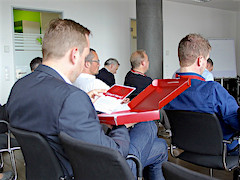econnect 2016 – Lessons on Doing Business with Germans
Cologne, 23 June 2016 – Preparation, punctuality and getting to the point are the keys to doing business with Germans. The members of the panel discussion on the Do’s & Don’ts of Doing Business in Germany, mentioned these three ‘p’s several times in their lively chat about their own experiences in international business.

Dr. Rolf Claessen (moderator), Dr. Béla Waldhauser, Vincenz Wagner, Staffan Reveman and Klaus Landefeld (left to right) first addressed what companies should avoid when making their first steps in Germany.
Your first steps in German business culture
- When it comes to meetings, try to be on time as much as possible.
- Don’t expect fast results – Do lots of preparation in advance.
- Don’t assume a meeting is just an exploratory meeting
- Be prepared, know your competitors.
- Germans want their concerns met before going forward.
- Know who are going to meet and find out what you can about them.
- Keep in mind that they might go with a German competitor to avoid having a language barrier, even if they have good English or French.
- Having someone on your team who speaks German helps.
Klaus Landefeld, Managing Director, Nexiu GmbH & Board Member, eco Association & DE-CIX Management GmbH, warned, “German companies are often very conservative and hard to contact. International trends in the Internet industry are slower to catch on here than in other countries.”
It is often harder to enter the market in Germany than internationally. If you want to do business in Germany, you have to bring your own money with you; don’t plan on expanding to Germany and expect to find business partners here. Investors should look at Berlin – that is where the brilliant and bright ideas are.
Dr. Béla Waldhauser, CEO, Telehouse Deutschland GmbH & KDDI Germany GmbH, has worked very closely for years with Japanese colleagues and customers. His Japanese co-CEO thought Germans and Japanese were very similar, punctual, focused on work, dedicated, results-focused, and hard-working.
While both are focused on achieving the target, Germans are not so interested in how they reach the target, whereas the Japanese want to document the process from beginning to the end. From the Japanese perspective, this requires lots of documentation and micro-management. Waldhauser recommends trusting that Germans will reach the target and do a good job.


Swedish power specialist Staffan Reveman, CEO, Reveman Energy Academy, found that there are less layers in the hierarchies of Nordic companies than in German ones. In Nordic companies, you are even expected to criticize your manager. Germany, in contrast, retains tradition structures in company organization quite often.
Vincent Wagner, Market Advisor, Enterprise Ireland, advises Irish companies that do business in Germany or are looking to enter the German market. Comparing the two nationalities, he says that Irish companies are very quick are getting to the market, while German companies take a lot of time getting ready for market, and are sometimes too slow in doing so. Irish companies sometimes need to slow down and do more preparation before pitching to Germans. Their products and services are not always market ready.
Moderator Dr. Rolf Claessen, Patent Attorney at the Freischem law firm in Cologne, asked the panel members to share their single most important piece of advice.
Klaus Landefeld warned, “You have to be careful with your business models. Data-driven models don’t always work here, as it can be hard to get the data because of consumer concerns. If your business model is based on data collection, it probably won’t work in Germany.”
“Germans are often seen as being rude, as they are very direct and get straight to the point,” Dr. Béla Waldhauser explained. “They follow the agenda and address concerns. Other cultures should keep in mind that this is not meant personally. Don’t think we are rude, we just communicate differently.”
“Germans are very task-oriented, rather than relationship-oriented”, Vincent Wagner added. “Germans find it strange to start with small talk, they first want to work out whether you are a credible and trustworthy business partner, and relationship building comes after that.”
He recommended Enterprise Ireland’s Guide to Doing Business in Germany for more background knowledge on German culture and business.
Kindly hosted by:
econnect ARCHIVE
 |
22.–23.06.2016 Cologne |
econnect on Tour – 2016 Agenda · Invitation (PDF) · Report · Photos |
 |
24.–25.06.2015 Cologne |
econnect on Tour – 2015 Agenda · Invitation (PDF) · Report · Photos |








